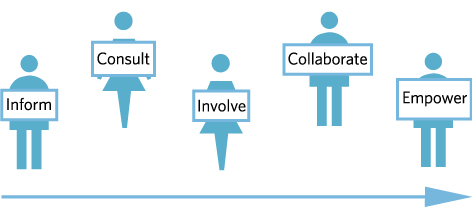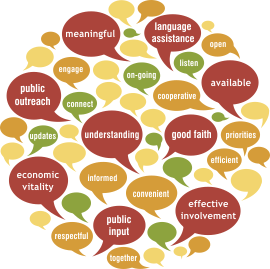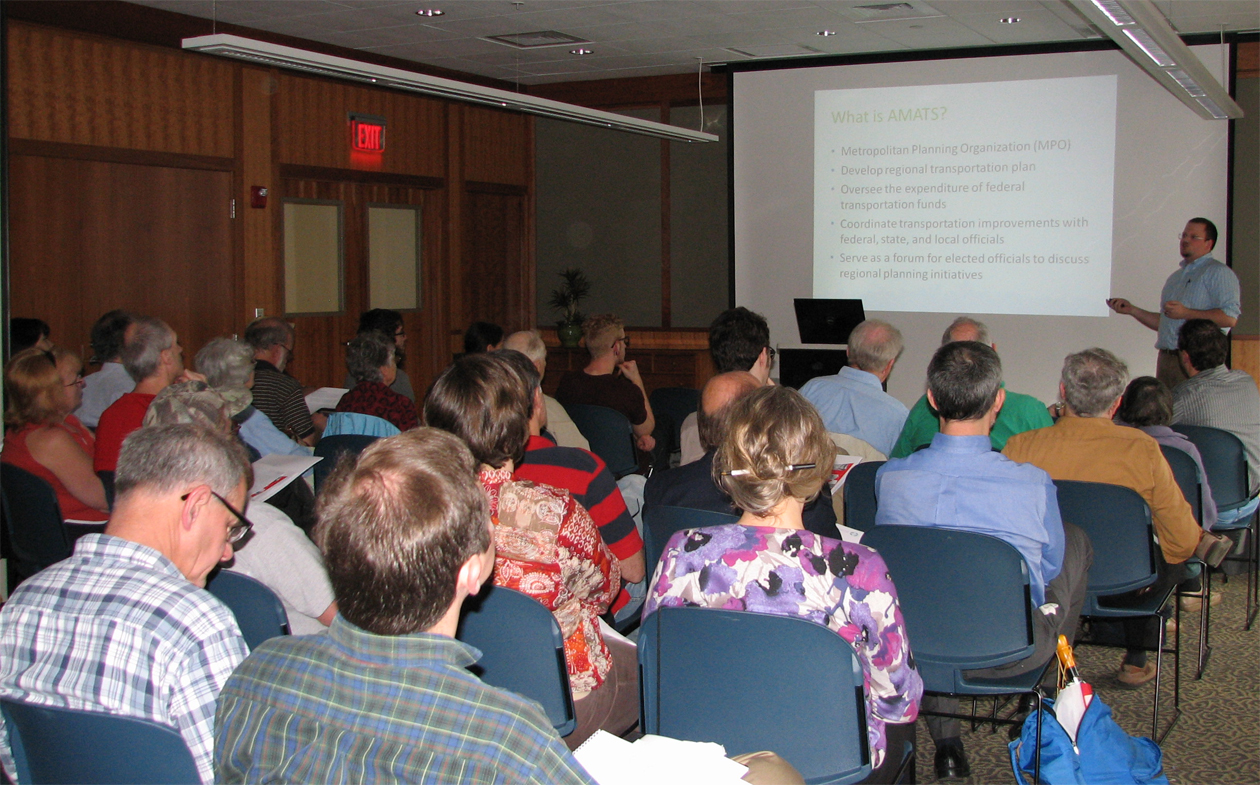Public participation
Citizen participation means participation ( "participation" ) of citizens in various policy decisions and planning processes ( civic community ). The term is not sharply defined and is used for a variety of different methods. In particular, it is not clear whether direct democratic decision-making processes such as the referendum must be included in the concept of citizen participation. In a narrower sense of the word are using the term citizen participation directly democratic procedures not mitgemeint, in another sense of the word, however, these methods belong to the meaning of the term to do so.
Especially at the local level citizen participation is comparatively often practiced in the strict sense of the word; more rarely comes in a narrow (though not in the other ) word meaning at the level of the state and federal apply. At European level, there are some years multiple attempts to formalize public participation and to integrate them into the political process, for example, by a decision by the European Parliament " Citizens 'Agora '. Citizen participation can be aligned with the participation of all citizens or only to certain groups (eg young people, inhabitants of a given area, etc.) are targeting.
With regard to the liability of public participation are two types of participatory processes can be distinguished: on the one hand, the statutory or formal participation procedure (also called authored participation) and on the other hand, the voluntary civic participation (also informal participation). With regard to the initiative, a distinction between participation in top-down process (the first step is taken of the executive or the municipal administration of the ) and the bottom-up method ( citizens take its own action initiative ).
Since European Law Amendment Act 2004, the construction of citizen participation in the German planning law is referred to as " public participation ", derived from the Public Participation Directive ( 2003/35/EC ). In municipal practice, this term has not enforced here is still spoken of citizen participation.
- 3.1 Germany
- 3.2 Austria
- 3.3 Switzerland
- 3.4 Europe
Partnership participation process
Urban land
The land use planning is a regulated through laws and other legislation, initiated by the administration can be integrated top-down process of formal public participation, in which bottom-up elements (eg, unsolicited suggestions angry citizens ). Of the stakeholders ( citizens, associations, other authorities ) opinions, objections, concerns or suggestions are formulated and submitted to the project proponent. This is bound to extend the scope of the so-called balancing on all arguments put forward. He must consider its relevance to the process and giving them proper consideration.
The public participation ( public participation ) on the urban land is regulated by a federal law, specifically § 3 Building Code ( Building Code ). There, a two-stage public participation is provided. It is divided into an early public participation, are carried out at the common public events for public information, and public interpretation, which usually takes place in the Planning Office. The early public participation is carried out with a first draft, often parallel to the authorities participation. The public interpretation is the final step before the consideration and the Council Decision.
Through public participation everyone should have the opportunity to protect its interests and legal positions in planning procedures, or in the planning process (eg, zoning, land use planning, etc.). The legislature hereby understands that as early as possible citizen participation increases the acceptance and the quality of planning.
In the first phase of public participation, the public is " as early as possible about the overall goals and purposes of planning, is essentially different solutions that are used for the redesign or development of a region into consideration, and to teach publicly the likely impact of the planning; it is to be given the opportunity to comment and discuss. " the planners municipality itself decides what form this involvement is performed. Widespread forms of participation are public meetings and plan notices at public places ( city hall, administration building, savings banks ). Increasingly the Internet for simplified and accelerated implementation of equity method is used e - participation. For this purpose are appropriate private and public service offerings available, eg so-called participation Server. It is not permitted to conduct public participation solely through the Internet (OLG Lüneburg). Public authorities and public agencies may be informed only as a supplement through the Internet in the context of early involvement (§ 4 ( 1) Building Code ).
The early public participation and mostly parallel to this, carried out involvement of the authorities and (also private ) public utilities, which are regarded as public agencies, planning gaining more binding and will eventually referred to as the draft plan, which already can get a legal liability. However, this is the second phase of the public participation requirement.
" The draft development plans are to be interpreted publicly on the grounds and in the opinion of the community essentially already present environmental statements for the period of one month. Location and duration of the interpretation and provide information on what types of environmental information is available are to make at least a week before local custom; it should be noted that comments during the inspection period will be issued and that it is not timely delivered opinions in the decision on the land use plan may be disregarded. "
The opinions form the core of the assessment material, which the local authority has to consider in the central planning procedures for the process of assessment. The faulty implementation of this process can lead to the nullity of the Bauleitplanes.
The public is informed of the participation process by customary notices. These often take place in local gazettes or through publications in local newspapers.
Informal citizen participation
In the informal ( non-statutory ) citizen participation a variety of shapes can be observed, the agenda depths of 21 or quality of life around the simple town hall meeting on hosted events such as the Future Workshop to elaborate participatory processes such as Local. Also in the context of city marketing may lead to large-scale citizen participation.
While communication between professionals involved and authority takes place directly in the formal public participation, defines the voluntary citizen participation in rule a much greater emphasis on discursive processes. The citizens have come together on a theme " this week ", exchange arguments and ideas to develop solutions. In such procedures, the administration often takes an advisory role, in which they neutral brings its expertise on the subject, without determining the discourse content. This discursive approaches have the great advantage that the ideas and thoughts of the participants are publicly visible, whereas in the formal public participation of individual citizens with the - for the individual often seemingly all powerful - administration " left alone " is.
Crucial to the success of volunteer citizen participation is the production of relevance. So the theme of the procedure should be something that is for the target group of interest. At the same time, the parties need to know that the incorporate of them developed results in the actual decisions taken by policy and administration. If these conditions are not met, many people are not willing to invest time in the participation in the process.
The voluntary citizen participation depends in municipal practice to all conceivable local political issues. This ranges from the participation in the most important local plans such as budget or land use plan for the area plans (eg for training ) to individual construction projects or activities to prevent crime or to protect the environment.
The Citizens' Panel is based on a representative sample of the electorate, who are asked to local political questions in writing or by Internet. But even citizens who do not belong to the sample can fill out a questionnaire, which is then also evaluated. Goal is more effective dialogue between citizens and politics.
Direct democratic participation process
The citizens of a community have the right to directly democratic way civil applications (in some countries also called " inhabitants applications " ) position and tasks by means of a citizens' initiative referendums, enforced by the will of the citizen majority against the city or municipal council and the administration can be. These are instruments of a bottom-up policy.
Development of citizen participation
In German-speaking first binding projects of citizen participation were presented at the beginning of the millennium as manuals and guidelines. You are quite young and tested local or regional. Persevere mostly on probation in individual cases (as of 2013). Direct democracy in Switzerland goes its own way.
Germany
In April 2013, the German Association of Cities advised the municipalities to systematically deal with the local participation and planning culture and to create a management report. As a possible consequence of the further development of guidelines and municipal codes is recommended. In a preliminary list of the network citizen participation of the Foundation staff a few dozen calls German cities with municipal binding rules for public participation (end of 2013).
The concrete implementation of public participation approach a handbook from the former Federal Ministry of Transport, Building and Urban Development and first municipal Council decisions on guidelines for public participation, inter alia, of Heidelberg and Leipzig.
Due to national regulations certain topics are excluded from civic participation, the finances, the budget and salaries. The financial conditional denied citizens the vote, although " almost everything you do in the policy and decides is financially relevant. "
Austria
In addition to local projects, there are dedicated participation and sustainable development of Europe as an initiative of the Federal Ministry of Agriculture, Forestry, Environment and Water Management, to develop citizen participation in Austria.
The City of Vienna presented a practical book for public participation.
Switzerland
Structured forms of citizen participation as dialogue and participation forums such as the PubliForum and the Regional participation to search for locations for radioactive wastes are not often employed in Switzerland.
Through the Swiss Constitution Referenda be guaranteed. This regional interests be able to compete at about infrastructure measures against the supposed common good. Along with the consultation process in which anyone can present his objections in the early project planning, leading to transparency, the pursuit of understanding and balancing of interests.
A financial subject to exclusion from voting issues is rarely used in Switzerland.
Europe
Public participation in environmental matters was first decided in the international treaty of the Aarhus Convention and then implemented by the European Directive 2003/35/EC, as well as in national legislation. In it, each person rights attributed to environmental protection. As participation was so in Germany the right to information, the opportunity to be heard and the erweitertete access to justice. Details are governed by the Public Participation Act, the Environmental Information Act, the Environmental Impact Assessment, among others
Methods of citizen participation
A wide range of methods and tools ( "Formats" ) have been developed for implementation of citizen participation in political decision-making and planning processes in the past few decades, with continually draw near new. Often, methods are developed for conferences or workshops successful in the public participation used. Each format has his individual advantages and disadvantages, so that not every method is automatically suitable for any purpose or target group. Furthermore, the political- legal and socio - cultural environment plays an important role. For example, the formats can be used regularly and successfully in a country fail in a different environment. Since the late 1990s, the use of the Internet plays an increasingly important role in citizen participation.
Below is a list of methods of citizen participation:
- Consultation, public consultation laws
- Citizens Energy Cooperative
- Citizen forums, town hall meeting, residents question hour,
- Participatory budgeting
- Charrette process
- Folkehøring, Future Workshop, Conference on the Future
- Ideas Competition
- Use of Liquid Democracy tools (Liquid Friesland)
- Mediation
- Public display of plans
- Open Space, Open Space Online
- Petition
- Planning for Real
- Planning Cell
- World Café
Criticism of the citizen participation
The political scientist Rainer Jogschies dismissed in 1984 with regard to land use planning in his case study citizen participation in urban planning point out that contrary to popular assumption, the formalized participation is not due to the political will to enhanced participation but had been introduced in his contemporaneous legislative procedure for Urban Development Act to to act as a " restriction on the possible abuse of power " of the planner. Thus, the legal framework is not necessarily promote democracy, because it primarily meant to " your own special protection" and thus the rule of law. Whether these more than 25 years earlier assessment date is still valid, is not certain. The phenomenon of " angry citizen " points out that in parts of German society, have greatly increased the Konfliktfreudigkeit and thus the need and willingness own interests " against those authorities ' enforce '. Newer models of participation as developed by Peter Dienel planning cell to try to counteract this.









